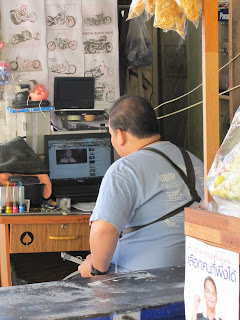The holidays aren’t really my thing, but I’ve decided I don’t mind New Years in Thailand too much. It was 80 degrees and sunny all day with plenty of time for reading, writing, running, badminton, necklace-making, napping, more reading, and more writing—all before the sun went down.
When it did, I and the other Westerners here (I need to do yet another cast of characters soon; my apologies) trooped over to the other girls’ home on the property just in time for dinner. It was a special night with two kinds of protein (egg and chicken!) as well as the ever-present and always delicious rice. Dessert was rice with sugar. Delicious.
I heard some of their stories, so I understand why. Our youngest girl, Tati, is only 16 months old and was brought to this girls’ home only a few weeks ago when her mother was selling her on the streets of Chiang Mai. Dora, once little more than a skeleton now a mini Dora the Explorer with chubby cheeks and big, round eyes, was found taking care of herself at the age of two while her alcoholic mother spent all the money she had on drinks. Nana, a little girl who loves to sing “Happy Birthday” and say “I love you,” suffered from a fever when she was seven that stagnated her mental capacity and her physical growth. She was too poor to go to school, but soon she hopes to enter a small school for mentally challenged girls.
After the serious stuff the girls watched a Thai movie (it looked hilarious) while the westerners sat and talked around a campfire. Around ten-thirty the movie was shut off and suddenly everyone was playing games and screaming and laughing. Everyone who lost got their names written down and had to act like a chicken when all the games were finished. By the time we’d all calmed down to have another snack—rice soup and jello, not mixed—it was quarter to midnight and time to light off the lanterns.
Have you seen Tangled? It was like that.
Then fireworks were set off while we were only feet away. The little girl next to me snuggled close and squealed (all right, I squealed a little too) when they banged only twenty feet above our heads. When the last lantern was launched and the last firecracked sparked, we all hugged and said “Happy New Year” and “sawadi pimai ka!”
As one of my little Thai sisters in Christ reminded us, “The Bible says that ‘the old has gone and the new is here!’”
Amen (so be it).



























